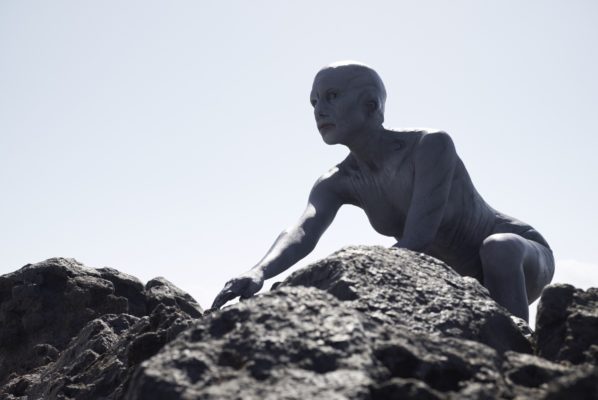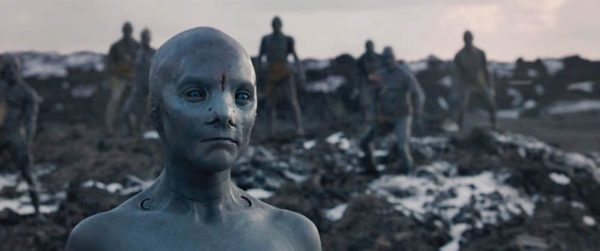
Coverage of the 2018 Fantasia Festival continues with the latest film from controversial French director Xavier Gens, Cold Skin.
Let’s bitch it out…
Xavier Gens’ films tend to tackle murky, uncomfortable moral quandaries. Frontiers is a prime example of New French Extremism, a brutal class conflict that pits city folk against country folk. The Divide is a disaster movie that quickly turns into an uncomfortable examination of the depravaties that befall humans under duress.
Cold Skin is different. It is a far more simplistic tale about two men – one young and naive, the other old and jaded – and how their values and ideals inform their respective approaches to conflict, played out on a stage that includes an inter species war.
Adapted from the bestselling debut novel by Catalan author Albert Sánchez Piñol, the film eschews some of the book’s backstories, but maintains the essential plot about two men attempting to maintain a lighthouse stronghold against a swarm of aquatic humanoid creatures nicknamed Toads.
The film begins in 1914 when a young Irishman (David Oakes) travels to a remote island in the South Atlantic. The early dialogue clarifies that he is escaping from something, but like so much else in Cold Skin the details are never revealed (or they are deemed inconsequential by the screenplay). The man, eventually nicknamed Friend, is due to remain on the island for a year, working as a meteorologist. The fate of his predecessor is uncertain, but after a night when his cabin is attacked by a legion of monsters, it is inferred that the first meteorologist met a bad end.
The only other inhabitant on the island is the caretaker of the lighthouse, Gruner (Ray Stevenson) – a grizzled older man who has no qualms leaving the young meteorologist to fend for himself. After the cabin is burned down in another attack, Friend forces his way into the lighthouse to uncover the truth: Gruner is at war with the Toads, eager to completely eliminate their race, even though he keeps a female named Aneris (Aura Garrido) as a pet/sexual companion.
Tensions eventually rise between Gruner and Friend over the treatment of Aneris and, more broadly, the extermination of the Toads, leading to battles that are both external and internal.

The screenplay was written by Jesús Olmo and Eron Sheean in a fairly lean and straightforward manner. The first act introduces the characters, the island and the conflict. The second act establishes an uneasy detente between Friend and Gruner that builds to a third act that pits Gruner’s genocidal plan to destroy the Toads against Friend’s crisis of conscience over their right to survive.
Cold Skin’s biggest issue is that there simply isn’t enough meat to the story. As characters, Gruner and Friend both remain undeveloped; they have simplistic motivations that barely evolve, and certainly don’t engender much audience investment or sympathy. Gruner is an unhinged kook at the start of the film and he remains one at the end. As played by Oakes, Friend is a milquetoast generic good guy – young and impressionable at the start, bearded and conflicted at the end – a bland attractive white guy who takes far too long to come to the right (ie: obvious) decision.
Garrido doesn’t fare much better: Aneris’ evolution from pet to the embodiment of the potential of her species is less about her than it is about Friend’s emotional growth. She exists solely to humanize the conflict, and the film doesn’t even pretend to shy away from her status as a physically attractive woman.
In true Gens fashion, there’s also an icky subtext about the way that women are “owned” and sexually abused by men (easily one of the least digestible aspects of The Divide). Here it is made even more complicated by the fact that for the most part Aneris doesn’t speak and her physical movements suggest a combination of infantalization and abuse. (For a more nuanced, interesting take on the same murky subject, seek out Vincenzo Natali’s far superior Splice).
Perhaps the biggest issue with Cold Skin is that it lacks the essential hook to reel in audiences for its nearly two hour runtime. Gens and Spanish cinematographer Daniel Aranyó do great work capturing the majestic beauty and inherent danger of the island and some of the action scenes are pulse-pounding, but those elements can’t overcome the didactic “us vs them” narrative.
In the end, the film is simply too slight and obvious.